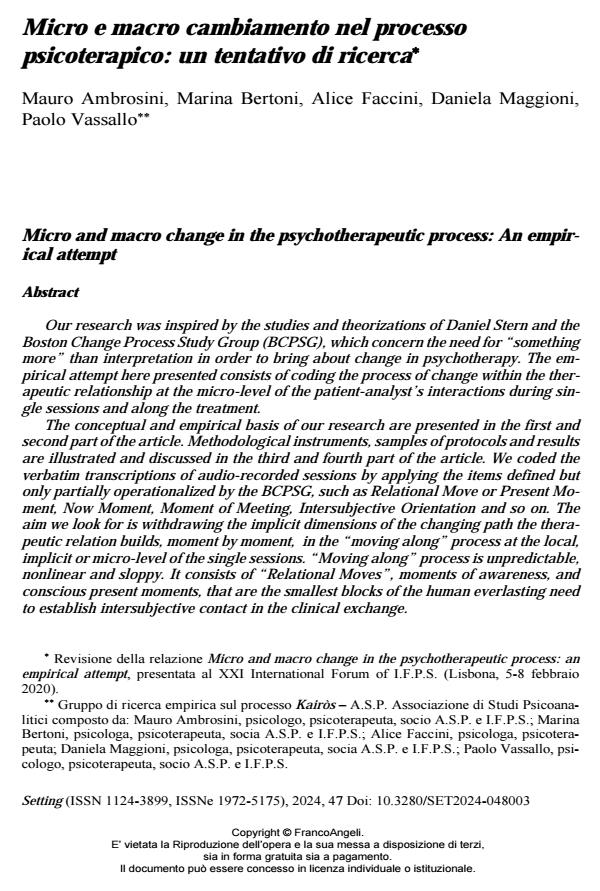Micro and macro change in the psychotherapeutic process: An empirical attempt
Journal title SETTING
Author/s Mauro Ambrosini, Marina Bertoni, Alice Faccini, Daniela Maggioni, Paolo Vassallo
Publishing Year 2024 Issue 2024/48
Language Italian Pages 35 P. 77-111 File size 630 KB
DOI 10.3280/SET2024-048003
DOI is like a bar code for intellectual property: to have more infomation
click here
Below, you can see the article first page
If you want to buy this article in PDF format, you can do it, following the instructions to buy download credits

FrancoAngeli is member of Publishers International Linking Association, Inc (PILA), a not-for-profit association which run the CrossRef service enabling links to and from online scholarly content.
Our research was inspired by the studies and theorizations of Daniel Stern and the Boston Change Process Study Group (BCPSG), which concern the need for “something more” than interpretation in order to bring about change in psycho-therapy. The empirical attempt here presented consists of coding the process of change within the therapeutic relationship at the micro-level of the patient-analyst’s interactions during single sessions and along the treatment. The conceptual and empirical basis of our research are presented in the first and second part of the article. Methodological instruments, samples of protocols and re-sults are illustrated and discussed in the third and fourth part of the article. We cod-ed the verbatim transcriptions of audio-recorded sessions by applying the items de-fined but only partially operationalized by the BCPSG, such as Relational Move or Present Moment, Now Moment, Moment of Meeting, Intersubjective Orientation and so on. The aim we look for is withdrawing the implicit dimensions of the changing path the therapeutic relation builds, moment by moment, in the “moving along” process at the local, implicit or micro-level of the single sessions. “Moving along” process is unpredictable, nonlinear and sloppy. It consists of “Relational Moves”, moments of awareness, and conscious present moments, that are the smallest blocks of the human everlasting need to establish intersubjective contact in the clinical ex-change. Our empirical method is catching and lightening the change process at the mi-cro-level in order to match its developing line with the change process at the macro-level ad well the clinical reasoning.
Keywords: Boston Change Process Study Group (BCPSG), change process, implicit knowing, intersubjective field, relational moves, Now Moment of Meeting, moving along, empirical research, micro-level.
Mauro Ambrosini, Marina Bertoni, Alice Faccini, Daniela Maggioni, Paolo Vassallo, Micro e macro cambiamento nel processo psicoterapico: un tentativo di ricerca in "SETTING" 48/2024, pp 77-111, DOI: 10.3280/SET2024-048003